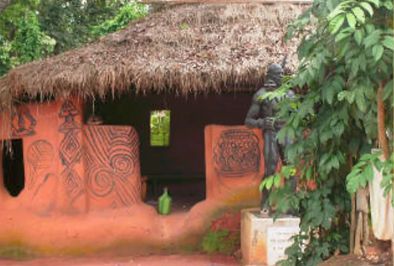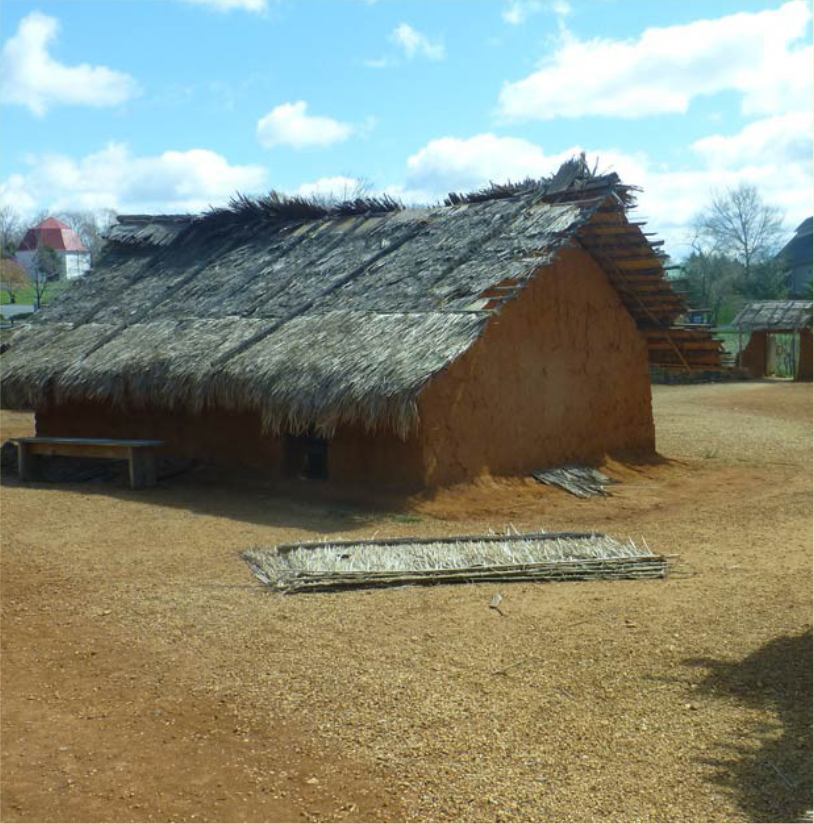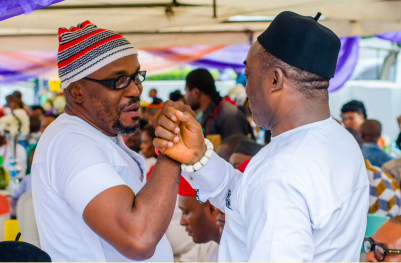Igbo Entrepreneurs
Orient Progressive Social Forum
Orient Progressive Social Forum represents a bold initiative led by socially innovative Igbo professionals, businessmen, and technocrats to revitalize and uphold the rich cultures of the Igbo people in South Eastern Nigeria
Resourceful Minds
Orient Progressive Social Forum
Orient is not merely a social club; it is much more. While it is not the first platform to unite Igbos, what sets Orient apart is its distinct objectives and vision for the Igbo people and nation. It is a platform for social re-engineering and nationalism, with the aim of uniting millions of innovative Igbo entrepreneurs, and professionals, to create a powerful and influential political and business network with significant investments in strategic sectors of the Nigerian economy and political sphere
Igbo Professionals
Orient Progressive Social Forum
Orient Progressive Social Forum represents a bold initiative led by socially innovative Igbo professionals, businessmen, and technocrats to revitalize and uphold the rich cultures of the Igbo people in South Eastern Nigeria

Our Root
The Igbo Tribe
Igbos are special tribes people and a nation of enterprising men and women in business, crafts trade and various careers. Like people of other tribes, Igbos come from a source; they have a root, an origin. But where do the Igbos come? Where did we originate from? Who is our fist ancestor and the original loins from where we all came?
Due to the effects of migration and the Atlantic slave trade, there are descendant ethnic Igbo populations in countries such as Cameroon and Equatorial Guinea, as well as outside Africa. Their exact population outside Africa is unknown, but today many African Americans and Afro Caribbeans are of Igbo descent. According to Liberian historians the fifth president of Liberia Edward James Roye was of Igbo descent.
Know Your Language
Click Here To Delve Into The Igbo Learning Experience


Who We Are
Some say Igbos come from Israel, the homeland of the world’s Jewish tribe- the biblical special people of God and direct descendants of Abraham the father of nations and direct ancestor of Jesus Christ the son of God. But the likes of the Late Prof. Catherine Acholonu-Olumba, one of Africa’s celebrated researchers and archeological writers, strongly dispute this version of the history of the origin of the Igbo people of Eastern Nigeria. Acholonu, in her two famous and controversial books –“The Gramcode of African Adam”, and “They Came Before Adam” insists that Igbos could not have originated from the Jews of Israel because they Igbos existed even before the Jews of Isreal came to be in existence.
Others say we come from Aguleri because we are the sons of Eri, while another school of thought insists we are of the direct lineage of a great ancestor- Nri. So for this school of thought we come from Nri kingdom, a community in Anambra State where the direct descendants of Nri are still reigning as kings and monarchs.
Our Root
The Nri people of Igbo land have a creation myth which is one of the many creation myths that exist in various parts of Igbo land. The Nri and Aguleri people are in the territory of the Umueri clan who trace their lineages back to the patriarchal king-figure Eri.[30] Eri’s origins are unclear, though he has been described as a “sky being” sent by Chukwu (God). He has been characterized as having first given societal order to the people of Anambra The historian Elizabeth Allo Isichei says “Nri and Aguleri and part of the Umueri clan, [are] a cluster of Igbo village groups which traces its origins to a sky being called Eri.
Archaeological evidence suggests that Nri hegemony in Igboland may go back as far as the 9th century, and royal burials have been unearthed dating to at least the 10th century. Eri, the god-like founder of Nri, is believed to have settled the region around 948 with other related Igbo cultures following after in the 13th century. The first Eze Nri (King of Nri) Ìfikuánim followed directly after him. According to Igbo oral tradition, his reign started in 1043. At least one historian puts Ìfikuánim’s reign much later, around 1225 AD.
Each king traces his origin back to the founding ancestor, Eri. Each king is a ritual reproduction of Eri. The initiation rite of a new king shows that the ritual process of becoming Ezenri (Nri priest-king) follows closely the path traced by the hero in establishing the Nri kingdom.


Our Root
The Igbo Tribe
The Igbo people are one of the largest ethnic groups in Africa. In rural Nigeria, Igbo tribesmen and women work mostly as craftsmen, farmers and traders. But they also have had some of the most prominent names in the nation’s political history and the military. The most important crop for the Igbos is the yam; with the New Yam festival celebrations take place annually to celebrate its harvesting. Other staple crops include cassava and taro. The Igbos are also highly urbanized, with some of the largest metropolitan areas, cities and towns in Igboland being Onitsha, Enugu, Aba, Owerri, Orlu, Okigwe, Asaba, Awka, Nsukka, Nnewi, Umuahia, Abakaliki, Afikpo, Agbor and Arochukwu.
Igbos have a long history of their origin which that sometimes constitute a point of disagreement among researchers, archeologist and historical writers. For example, Pottery dated at around 2500 BCE showing similarities with later Igbo work was found at Nsukka, along with pottery and tools at nearby Ibagwa; the traditions of the Umueri clan have as their source the Anambra valley. In the 1970s the Owerri, Okigwe, Orlu, Awgu, Udi and Awka divisions were determined to constitute “an Igbo heartland” from the linguistic and cultural evidence.


Who We Are
Geographically, the Igbo homeland is divided into two unequal sections by the Niger River – an eastern (which is the larger of the two) and a western section. Culturally and linguistically, the Niger River has provided an easy means of communication and unity amongst the Igbo natives on both sides, as well as promoted ancient trade and movement of peoples between Igboland and the rest of the world.
The culture of Ndi Igbo has been shaped primarily by Igboland’s rainforest climate, its historic trades, ancient migration folklores and social ties with its neighbours as well as far-flung trading and political allies and lately with the Europeans through colonization and the entire Western World through globalization. They speak Igbo, which includes various Igbo dialects that make up the Igbo language. The Igbo people who live in their original homelands, namely the five states of the South Eastern Nigeria; Abia, Imo, Anambra, Enugu and Ebonyi, are almost surrounded on all sides by other ethnic peoples of southern and central Nigeria namely, the Ijaw, Edo, Isoko, Ogoni, Igala, Tiv, Yako, Idoma and Ibibio
gbo state.
Our Root
By the mid-20th century, the Igbo people developed a strong sense of ethnic identity. Chinua Achebe’s Things Fall Apart is one of the most popular novels to depict Igbo culture and changes under colonialism. As in the case of most ethnic groups, the British and fellow Europeans identified the Igbo as a tribe. Chinua Achebe, among other scholars, challenged this because of its negative connotations and possible wrong definition. He suggested defining the Igbo people as a nation although the Igbo do not have an officially recognized physical state of their own.
The Igbos have been part of the Nigerian state since after the artificial creation of the British colonial rulers. However, due to perceived sense of injustice meted out to them by a central government dominated by the Northern people, Igbos have had a fractious relationship with the rest of the Nigerian state especially the North. Certain conflicts arising from this contexts led to Igbo-densely populated Eastern Nigeria seceding to create the independent state of Biafra. The Nigerian Civil War or the Nigerian-Biafran War (6 July 1967 – 15 January 1970) broke out shortly after. With their defeat, the Republic of Biafra once again was part of Nigeria. MASSOB and IPOB, two sectarian organizations formed in 1999 and of late, continue a non-violent struggle for an independent I

Know About The Region
The Southeast Region Has a Rich History and Heritage.
OUR MISSION
To harness the potential of young professionals and entrepreneurs from the southeastern states in fostering unity and development within the society. And to build the Igbo nation into a world tourism hub through the conscious revival and promotion of the rich cultural heritage of the Igbo people of South eastern Nigeria.
OUR VISION
To be a catalyst of development and economic prosperity across the southeastern states, to foster national unity while working as the most powerful platform for the socio-political emancipation and empowerment of Igbos anywhere in the World by building a powerful network of innovative Igbo professionals and entrepreneurs for the overall interest of the Igbo ethnic nation.
OUR VALUE
O-Originality
R -Resourceful
I -integrity
E-Excellence
N-Networking
T- Team Work
Mentorship Program
Overview
Our mentorship initiative is primarily targeted at students within the southeastern state, with the overarching aim of empowering the next generation to forge resilient career paths and embody ethical values that will, in turn, contribute to the advancement of the southern states. This comprehensive process will persist until the desired outcomes are realized.
Social Engineering Project
By engaging students in academic and social pursuits such as debates, science and art competitions, focused seminars, talk shows, and specialized training, this project endeavors to inspire a commitment to moral values while upholding the rich cultural heritage of the Igbo land.
- LOCATION: SOUTH EAST
Mentorship
Selected students from each phase will be paired with accomplished individuals in their respective career domains to receive guidance and firsthand experiential learning. Once mentors are available, students will be digitally connected to them for ongoing support
- LOCATION: SOUTH EAST

O-Originality
R -Resourceful
I -integrity
E-Excellence
N-Networking
T- Team Work
Orient serves as a safeguard for our cultural heritage, providing a space for ambitious and entrepreneurial Igbos to utilize its investment resources and political connections to pursue their life goals, expand their businesses, and advance their professional careers. With the risk of their rich cultural heritage fading away, a unified and formidable front is essential for effective participation in national politics and economic influence.

